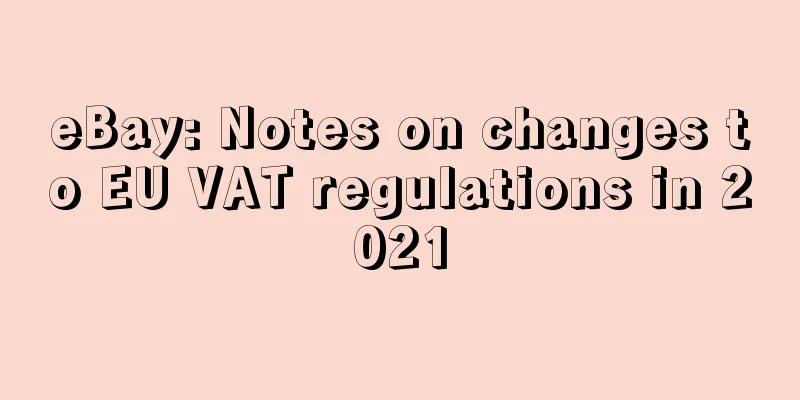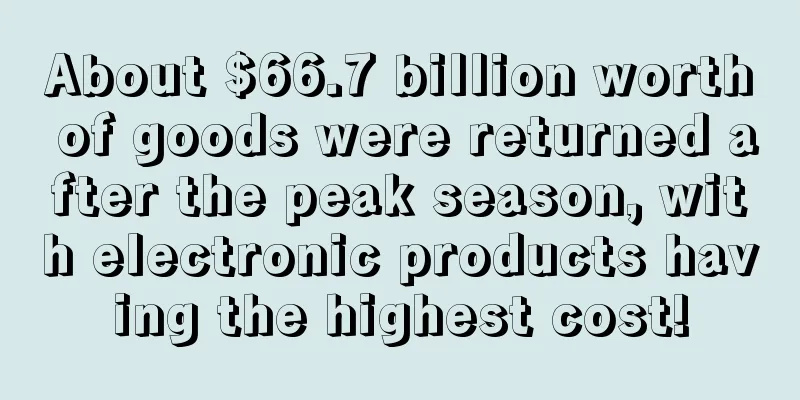eBay: Notes on changes to EU VAT regulations in 2021

|
On March 10, eBay China’s official website released an announcement entitled "Notice on Changes to EU VAT Regulations in 2021". The announcement stated that eBay had informed sellers in 2020 that from July 1, 2021, the VAT regulations for goods imported into the EU and some goods within the EU will change. eBay will collect and pay the EU VAT based on the seller’s location, the value of the goods and the location of the goods .
At the same time, eBay also requires all sellers to provide tax-inclusive prices and separate VAT rates in their listings so that eBay can determine the correct amount of VAT to be collected. Cross-border sellers should evaluate the impact of the above changes on their business and prepare for these changes. eBay will continue to update relevant announcements on this topic, so sellers are advised to stay tuned.
In addition, sellers need to know that the EU will cancel the current VAT exemption for low-value goods imported into the EU with a value of no more than 22 euros from July 1, 2021, and the distance sales threshold for cross-border sales within the EU will also be abolished on July 1, 2021.
After July 1, the EU will make significant changes to the way VAT is collected on goods imported into the EU, on sales of goods within the EU by non-EU sellers, and on cross-border sales of goods within the EU by EU sellers, including:
1. Cancel the provision that low-value ( less than 22 euros) imported goods are exempt from import VAT; 2. For goods imported into the EU and sold to EU consumers with a value not exceeding 150 euros, e-commerce platforms or customs declarants may withhold VAT; 3. For sellers from non-EU companies, if the goods have been pre-stored in the EU and sold to consumers in the EU or sold from one EU country to another, the e-commerce platform may collect and pay VAT on their behalf. The EU has very high compliance requirements, especially as the government deficit rose sharply in 2020 and the e-commerce industry developed rapidly. EU countries will also pay more attention to e-commerce VAT. Sellers are required to register for VAT as long as they use operations centers or overseas warehouses within the EU, sell goods to individual sellers in EU countries exceeding "remote sales", import goods to the EU, sell goods to corporate sellers in EU countries, and transport goods between operations centers in different countries. E-commerce platform eBay Platform VAT |
<<: AliExpress counterfeit products named in Spanish market
>>: South Korea's online food delivery market grew 79% in 2020
Recommend
Priced at 700 million! Huakai Yibai is going to acquire Tongtuo
Huakai Yibai’s acquisition of Tongtuo Technology,...
On Buy partners with LEGO to demonstrate market presence
Recently, OnBuy has partnered with the LEGO brand...
Austrian e-commerce market survey: online shopping satisfaction rate reaches 92%
Online shopping frauds are emerging one after ano...
Big news! Tencent acquires stake in Japan's Rakuten. Is the e-commerce dream coming true today?
In 2020, the e-commerce industry suddenly became ...
What is TweetDeck? TweetDeck Review, Features
TweetDeck is a Twitter account management tool, an...
Gender-neutral trend is coming, American women buy more than 3 billion men's clothing!
Many times, we subconsciously believe that women ...
Sellers beware! Thailand's e-commerce market will strengthen intellectual property protection
As the number of online stores operating on e-com...
A super large container ship was stranded on the way! It had been docked in Shanghai, Ningbo, Qingdao and other ports
According to foreign media reports, on December 2...
What is SellerSnap? SellerSnap Review, Features
Seller Snap was founded in 2016 to create a new an...
What is Amazon Aggregator? Amazon Aggregator Review, Features
Amazon Aggregator is focused on fostering a vibran...
What is Link Logistics? Link Logistics Review, Features
Lingxun Logistics is a Chinese cross-border B2C co...
Amazon officially announced the second "PD promotion" this year
Recently, Amazon announced that it will hold anot...
What is RevSeller
RevSeller is an Amazon tool that can help you che...
The 2021 Middle East B2B e-commerce trends are released, and sellers need to work hard in these three aspects!
According to a 2019 digital transformation study ...
Amazon is sued by Chinese sellers for causing accidents with their products
A 19-month-old girl ingested a lithium-ion batter...









